News & Events in Belarus
Belarus president gives first lesson to senior school students

MINSK, 2 September (BelTA) – While visiting a newly built school in Minsk on 2 September Belarus President Aleksandr Lukashenko gave the first lesson to a class of senior school students, BelTA has learned.
Just like in other schools of the country today the first lesson was dedicated to how the students see the present and future of Belarus, their contribution to the development of the country.
Aleksandr Lukashenko went into a classroom, got involved in the teaching process, and called several students to the blackboard in order to exchange opinions. The conversation touched upon education in school, the choice of the future career, sport, ecology, and many other things.
“My heart trembles as soon as I enter a classroom. I started my career like that once [as a school teacher], this is why it is very pleasant,” Aleksandr Lukashenko remarked as he entered the classroom.
The kids and the teacher were just discussing Belarus’ development and what should be done to get the process going forward in leaps and bounds. “It would be difficult to do that in leaps and bounds. I’d be glad if you and your optimistic teacher would add more dynamics to Belarus’ development. It is right that he sets such tasks for you to achieve!” the head of state noted.
Aleksandr Lukashenko noted that a lot can be manufactured in Belarus but it is important to sell these goods on foreign markets. “Competition is very tough. I’ll be glad if our country develops rapidly once my time as the president is over,” he stressed.
The students were invited to ask the head of state questions but Aleksandr Lukashenko decided to have a dialogue in a different way. He took the class register and called some students to the blackboard for a detailed conversation.
Work involved in the education process
A girl named Anna was called first. She said she would like more people to go in for sports and have fewer bad habits. She also said she would like faster development of the IT industry.
Aleksandr Lukashenko drew attention to the practical side of things: it is possible to go in for sports, particularly high-performance ones, only when money to spare is available. “A good manufacturing sector is necessary to earn the money. We need to acquire this knowledge, it is all about hard work first and foremost,” the president said.
He referred to his own example of intensive studying, which had allowed him to finish school with flying colors. “You will have a hard time working if you don’t have basic knowledge,” the Belarusian leader pointed out.
The president stressed that a lot of things in life depend not only on the state but on the desire and willingness of its citizens. The years in school represent an important stage. “Don’t lose this precious time,” he added.
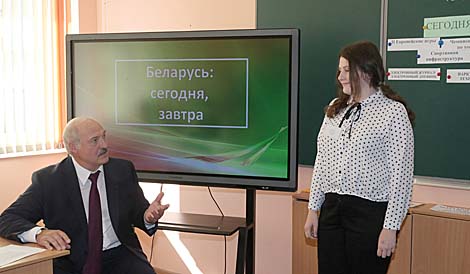 IT industry
IT industry
“As for the IT industry, we’ve drawn too much attention to this matter. Everyone wants to be an IT professional. But all of you can’t be IT specialists. I’ve created the industry in Belarus from scratch and know it well. Not everything is good and well in the IT industry. But most importantly not everyone has the aptitude for this kind of work,” the head of state warned.
Aleksandr Lukashenko remarked that other areas of the country’s economy and the people’s life as a whole are as important. “Where does any IT professional go after work? He or she goes shopping. And shopping industry employs blue-collar workers (apparel, footwear, food) for now. Information technologies can increase performance, improve quality, reduce costs. It is an auxiliary [component] for now. Information technologies have been more beneficial in some other areas – space exploration, high tech, nuclear energy. But you shouldn’t aim for IT as your mandatory goal. You would aim for false goals if you did.”
Money and smartphones
Yelisei was the next student to go to the blackboard. The president wondered what he would like to change in the country. The student responded right away it would be nice to make shopping even smoother and faster by using fingerprints instead of cash or plastic cards.
“So you want to make the life simpler…” the president noted. Aleksandr Lukashenko recalled the hard days of his childhood: “Poverty was dreadful. We didn’t have enough money. One had to work the entire summer to earn some money and get proper clothes.”
Speaking about transactions facilitated by fingerprints, Aleksandr Lukashenko noted: “We are on the way to it.”
The students said they would also like to have bus stops equipped with smartphone chargers. The president responded it was not a problem but told them to be careful while using smartphones and think about the security of personal data. “If you bring smartphones to school, they shouldn’t interfere with your studies. Otherwise, you will become severely dependent on this aspect of progress of our society. Don’t lose sight of the traditional keeper of knowledge – books. Don’t forget about them,” the Belarusian leader said.
Apparel
The president advised the school students to dress smartly without going to extremes. “Don’t spend too heavily on it. There is no need to focus on it excessively,” he said.
Aleksandr Lukashenko remarked that many politicians and rich people in the West wear simple clothes: “With time I came to understand they don’t want to pay too much attention to it. It is unwise to think too hard about what to wear.”
Electric transport and ecology
One of the students spoke in favor of more vigorous development of car sharing and similar services involving the renting of bicycles, scooters, and other kinds of transport. It would be good for ecology, she said.
Aleksandr Lukashenko admitted he was a fan of electric transport. “An electric motorcycle is my favorite. Our M1NSK factory already makes them. They are excellent. Certainly, they cannot reach speeds of 180kmph like Tesla cars can. But they are a pleasure to ride. I support you on this. We are going to favor electric cars more and more,” the president said.
Aleksandr Lukashenko said that there are many people, who would like to live and work in Minsk’s downtown while territories near the Minsk ring road are frowned upon from the ecological point of view due to the large number of cars. However, the situation is totally different, Aleksandr Lukashenko is convinced. “Cars travel [along the Minsk ring road] fast. All the fuel is burnt up. The process does not leave the grime that you can see in avenues in the city proper. If there is no wind, a lot of exhausts are accumulated and stay in central avenues. Where you work and live. Which is stupid. It is much better to live far from the downtown from the ecological point of view,” the Belarusian leader noted.
Aleksandr Lukashenko also underlined the need for beautification and greenery planting. A lot of attention is paid to it, including within the framework of the three Years of Native Land.
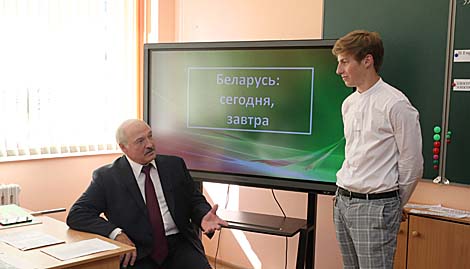 Sports
Sports
Another student drew the head of state’s attention to the development of sport infrastructure particularly in the regions. He pointed out that he had once seen kids playing football in a grassy clearing using their schoolbags as goalposts. “We cannot place proper infrastructure everywhere. Kids will be kids. If they feel like playing football, they may drop their schoolbags somewhere and start playing right away. I know this feeling,” Aleksandr Lukashenko noted. He said he had hurt his knee while playing football like that as a kid.
Yet Aleksandr Lukashenko agreed there is still work to do as far as the availability of sport infrastructure is concerned. “You are right. It is our fault to an extent,” the president said.
As a positive example Aleksandr Lukashenko noted that students of this school would be able to go skiing. “You will learn how to ski. It may come in handy in time. It did for me. I was not an ice hockey player but we used to play in the snow when I was a kid. We used to tie skates to the felt boots. After I hurt my knee, I started playing hockey. It didn’t require drastic movements. I remember it now,” the head of state said.
“You are absolutely right. It is good that you notice such things,” Aleksandr Lukashenko told the school student. He added: “Since you can see the shortcomings right away, you will be a good manager.”
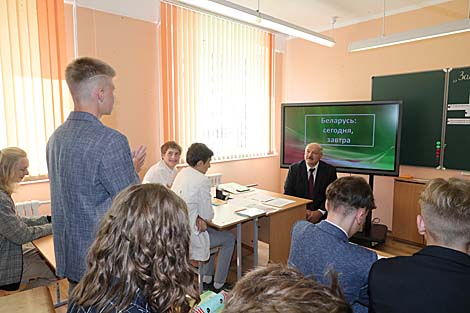 Professions in demand
Professions in demand
Aleksandr Lukashenko was asked what professions would be in demand in the future. “All of them,” he said. “You can see them. Once again don’t try too hard to become an IT guy or a great cosmonaut or an explorer. Study calmly. You will feel your aptitude for something. If you like math, follow your dreams. Any professions you know will be in demand in the future. After all, you will be able to invent your own profession. But remember you have to have the aptitude for it. If you don’t, you will be able to do the job but it will be hard,” Aleksandr Lukashenko shared his opinion.
From his point of view a school teacher or the manager of some company are the best professions. “I’ve gone through all these steps. I cannot say the head of state is the best job. Working in agriculture was a pleasure,” the Belarusian leader said.
Speaking about his work as a school teacher, Aleksandr Lukashenko stressed that he would not have become the president without that experience, without pedagogical education.
“You definitely have to study!” the president told the school students.
School syllabus
Aleksandr Lukashenko believes that the secondary school has to provide a base of knowledge without going deep into narrow specializations. “We don’t need to squeeze all the knowledge into kids over the course of 11 years in school. We need to give them the basics. So that they could decide what to do later on. If they go to university and study math and physics, then yes, they will have to study day and night. But it will be easier than school because you can keep moving along the path you’ve chosen,” the head of state noted.
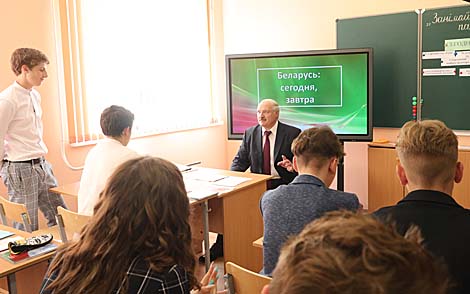 Fight against addictions
Fight against addictions
One of the kids mentioned the problem of addictions spreading among young Belarusians, including school students. “I absolutely support you,” the president said.
“I don’t even want to talk about narcotics. We’ve recently passed the most rigorous legislation. Mothers of those serving prison time now request some lenience,” Aleksandr Lukashenko noted. “The relevant laws were passed upon my initiative. We may have gone overboard in some aspects. Those, who use narcotics, are sick people. And I thought they should be reeducated through labor in a correctional facility. We are doing just that but the withdrawal process can be terribly painful without full medical aid.”
“This is why it may be a good idea to pay more attention to treatment. But we cannot forgive those, who use [drugs],” Aleksandr Lukashenko said.
“I think I should meet with those parents, who would like to meet with me. But I will have to tell them something and we are now thinking what we can do in this regard. But those, who bring drugs here and distribute them, will get no mercy. People, who use drugs, are capable of anything. Those are dreadful people. And those, who represent the source of this dreadful evil, will be punished,” the Belarusian leader stressed.
Aleksandr Lukashenko said he believes that it is necessary to carefully and step by step introduce restrictions and prohibitions, including against smoking in public places, against tobacco sales. “As for the anti-drugs legislation, we’ve found out we’ve gone a bit too far. We’ll relax it a bit,” he added.
Discipline
The president called for more discipline in schools, more dedication to studying and getting results. “The school should be brought to its senses. The school is a temple. You come here to get free education,” he remarked.
“We should not be afraid of banning phones and various gadgets. They interfere with the educational process. You can survive without them in school for half a day. So Belarusian schools need proper order. They need discipline,” Aleksandr Lukashenko stressed.
Aleksandr Lukashenko pointed out that certainly the person of the teacher, his or her professional skills and the ability to get students interested in learning are important as well.
In conclusion a photo was taken of the head of state and the students.
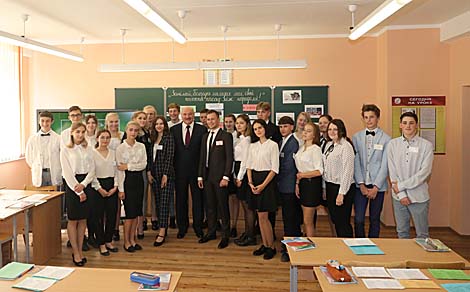 The president was made familiar with capabilities of Minsk’s new school No.93. In particular, the head of state took a look at the choice of dishes in the school’s canteen. Aleksandr Lukashenko pointed out that the choice had to favor Belarusian cuisine and Belarusian foods. Yet all kids should get proper meals and on equal terms.
The president was made familiar with capabilities of Minsk’s new school No.93. In particular, the head of state took a look at the choice of dishes in the school’s canteen. Aleksandr Lukashenko pointed out that the choice had to favor Belarusian cuisine and Belarusian foods. Yet all kids should get proper meals and on equal terms.
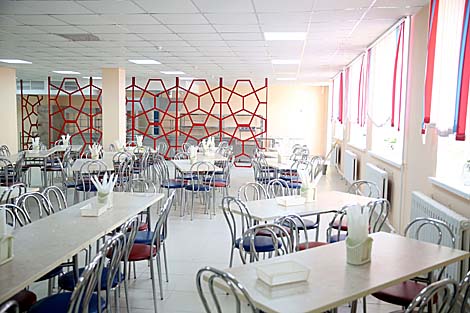 “You should feed standard, traditional food to the kids. They have to eat what we grow in the country. Don’t forget: they will grow up and will like to eat the food they ate as kids. I know I did. I can cook any food but my meals are very simple,” Aleksandr Lukashenko noted. “Be frugal but meals should be tasty and made of local foods.”
“You should feed standard, traditional food to the kids. They have to eat what we grow in the country. Don’t forget: they will grow up and will like to eat the food they ate as kids. I know I did. I can cook any food but my meals are very simple,” Aleksandr Lukashenko noted. “Be frugal but meals should be tasty and made of local foods.”
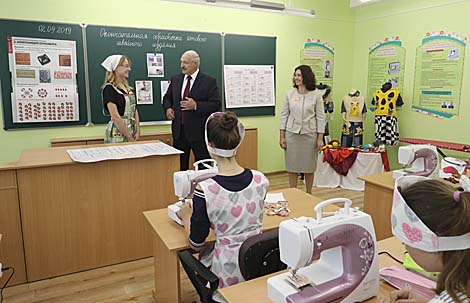 During the visit the head of state also went to the workshops where students are taught to work with fabrics and wood. He examined the sport premises where girls were playing basketball and boys were playing handball. He signed a ball as a commemorative gift for the kids.
During the visit the head of state also went to the workshops where students are taught to work with fabrics and wood. He examined the sport premises where girls were playing basketball and boys were playing handball. He signed a ball as a commemorative gift for the kids.
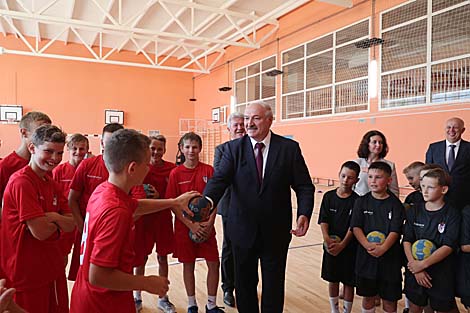 At the end of the visit souvenirs made by the school students – dolls resembling first-form boy and girl students – were gifted to the head of state. Aleksandr Lukashenko praised the workmanship and gave instructions to put the dolls along with other souvenirs from foreign heads of state and what not in the museum in the Palace of Independence.
At the end of the visit souvenirs made by the school students – dolls resembling first-form boy and girl students – were gifted to the head of state. Aleksandr Lukashenko praised the workmanship and gave instructions to put the dolls along with other souvenirs from foreign heads of state and what not in the museum in the Palace of Independence.
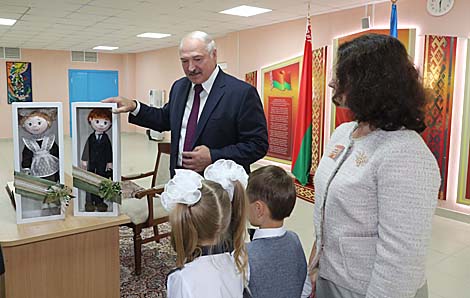 The head of state also left a note in the distinguished visitors’ book. The head of state wished the new school to become a cozy home for many generations of students and pedagogues: “May it ever be full of friendship and mutual respect. May every new day give everyone the joy of interesting revelations and personal accomplishments.”
The head of state also left a note in the distinguished visitors’ book. The head of state wished the new school to become a cozy home for many generations of students and pedagogues: “May it ever be full of friendship and mutual respect. May every new day give everyone the joy of interesting revelations and personal accomplishments.”
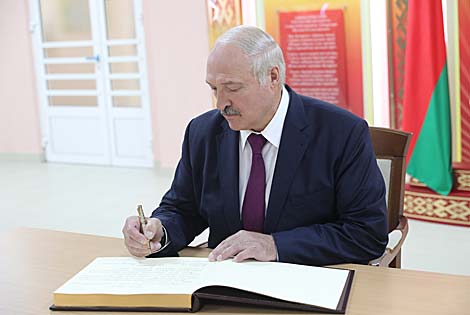


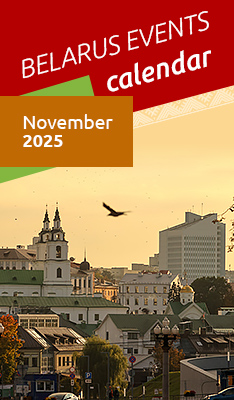




 print version
print version make home page
make home page add to bookmarks
add to bookmarks

